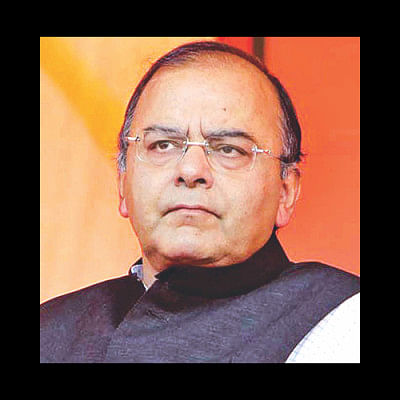Cashless is the way forward: Jaitley

Indian Finance Minister Arun Jaitley, a promoter of cashless economy, yesterday said cash leads to tax evasion, corruption and affects the poor.
“And in fact, excessive cash operates against the poor,” he said at a talk on the macroeconomic initiatives of the government of India.
A person who has excessive cash is able to deprive the state of revenue, which, otherwise, would be used for the benefit of the economically deprived.
“Cash also has anonymity when it operates in the market. Nobody knows who the owner of the cash is,” said Jaitley, who arrived in Dhaka on October 3 for a three-day visit.
The event was organised by the High Commission of India in Dhaka in association with the Policy Research Institute of Bangladesh at Dhaka's Pan Pacific Sonargaon Hotel.
Finance Minister AMA Muhith was present at the programme that was attended by economists, businesspersons and government officials.
At the event, India also launched cashless visa services for Bangladeshi visa seekers.
Under the initiative, one can deposit visa processing fee through cards, mobile wallets and internet banking to the Indian Visa Application Centres, which is run by the State Bank of India on behalf of the Indian high commission.
In his speech, Jaitley said the Indian government took various steps to become a cashless economy.
India's economy has been one of the fastest growing in the world in the last three years. “But one of the great challenges that we always faced was that it was a cash-centric economy.”
Initially, the Indian government took steps to ensure financial inclusion of all by opening bank accounts.
In 2014, 58 percent of the Indian families were connected to the banking system, although the country has a very large banking network.
Jaitley said 30 crore bank accounts were opened under a campaign and 78 percent of the accounts did not have any single rupee. So, the rules were amended to allow a zero-balance in account.
To keep people to hold on to the banks accounts, some incentives -- very low-cost insurance and pension policies -- were given.
Jaitley said people were told that they would get Rs 2 lakh as accident insurance for Rs 1 premium a month and Rs 2 lakh for life insurance.
“And literally millions of people started subscribing to these policies. Each one of them was given the facility of having a RuPay debit card (an Indian version of credit/debit card).”
They were given an overdraft facility too, he said.
Later, the government introduced cash transfer to poor instead of offering commodities such as food at subsidised rates.
“Today, we have less than 20 percent bank accounts that have zero balance,” said Jaitley.
The India economy is highly cash-based and 86 percent of all currency in India is of high denominations.
“And therefore a very large part of the economy just thrived on cash. And when you thrive on cash the curse of cash also hits you. Cash leads to tax evasion. Cash leads to shadow economy. Cash leads to corruption.”
To bring down cash-based transactions, India took various measures such as giving opportunity to bring assets held by persons outside of the country upon payment of high tax and demonetisation of large denominations of notes.
It also made holding assets under a fake name a criminal offence, he said.
The measures compelled the owners of cash to go to the banking system and declare the ownership, according to Jaitley.
Through the process, the Indian government has been able to identify 18 lakh people whose deposits are disproportionate to their income.
“As a result, the quantum of cash currency has been squeezed in the society. Now, the demonetisation is complete. We have less cash operating,” he said, citing the increase in digital transaction and income tax to further his claim.
Terrorists also were squeezed with the cash flow, he said.
About the newly introduced Goods and Services Tax, he said the system brings the entire chain of economic activities into one tax structure. “It is also increasingly making cash generation a lot more difficult,” he said.
And the impact of this in the long-run and medium-run will be expansion of the Indian economy.
“Make it a cleaner GDP and, eventually, make it a much bigger GDP -- this has been the intention as far as the government is concerned,” he said.
The Indian minister said public investment has increased and the country has opened up its foreign direct investments policy. “Some 95 percent of the FDI that comes into India is now automatic.”
“Besides, the corporate tax rate would be slashed to encourage investment. The Indian government is also focusing on improving infrastructure and invest in rural areas to reduce disparity,” he added.
Muhith said ICT is one of the strongest instruments to eliminate corruption.

 For all latest news, follow The Daily Star's Google News channel.
For all latest news, follow The Daily Star's Google News channel. 



Comments